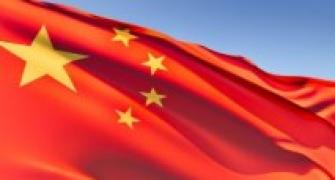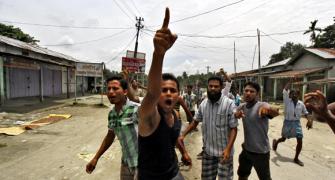The low profile nature of the visit and media's virtual silence could well have been orchestrated by the Indian government. But the visit indeed ought to be taken seriously and an analysis of the possible motivations and likely discussions between the two sides is necessary as it can directly affect national security, says Colonel (retd) Anil Athale.
Even by the dismal Indian media standards, (where on television a boy being slapped in a Delhi school is 'breaking national news') the silence and absence of comment over the recent five-day visit (September 3-8) by the Chinese defence minister was an extraordinary occurrence.
The fact that General Liang Guanglie's visit was the first one after eight years and took place at the time of rising tensions in South China Sea, ought to have elicited comment in the national media. It seems that the visit was almost treated like a 'secret' visit! While the Indian media was silent, the officially controlled Chinese media gave it due prominence. True to the Chinese way of doing things, there was no joint statement or press conference at the end of the meeting.
The low profile nature of the visit and media's virtual silence could well have been orchestrated by the Indian government. But the visit indeed ought to be taken seriously and an analysis of the possible motivations and likely discussions between the two sides is necessary as it can directly affect national security.
The Chinese defence minister did not come directly to India but had a stopover in Colombo in Sri Lanka. This was the Chinese way to convey to Indians that they treat India as just one of the South Asian countries not meriting any special treatment. Earlier, the Chinese Vice President Xi Jinping, widely regarded as successor to the current President Hu Jintao, did not visit India during his world tour. All this has been part of the Chinese policy of refusing to accept any kind of parity with India.
That the visiting Chinese minister skipped paying homage at the 'Amar Jawan Jyoti' was to be expected. But his giving a Rs 50,000 'tip' to the Indian Air force pilots who flew him from Mumbai to Delhi was extraordinary. If deliberate, then it was a calculated insult to the Indian Armed Forces. The possible explanation could be that the Chinese side possibly bungled up on carrying mementos and this was a spur of the moment improvisation. In either case it must have left a very bad taste for Indians. There were no expectations on a breakthrough on border dispute and the usual noises were made about military to military contacts etc.
History may offer some guidance to understanding the motives of the Chinese. In 1956, the then premier of China Chou En Lie visited India with a huge delegation. India honoured him by asking him to take a salute at the passing out parade at the National Defence Academy. The delegation was shown round ammunition factories, visited field units and my battalion actually gave an attack demonstration in Narayangarh field firing ranges near Ambala. When the Chinese attacked in 1962 my battalion faced them at the Namka Chu River. In retrospect it appears that the Chinese carefully assessed the Indian military potential and drew their own conclusions.
More information has now become available in the public domain regarding the motivation/circumstances of the Chinese attack in 1962. China was reeling under artificial famine due to the 'Great Leap Forward' policy of Mao. According to one estimate close to 13 million Chinese died in that famine. Mao's leadership was under threat. He found an easy scapegoat in militarily weak India. It seems that the crisis in China Sea over islands of Senkaku (and Beijing calls the Diaoyu) with Japan is reaching a flash point. This comes on the back of American declaration of making Asia-Pacific a 'pivot' of its naval power. China may well have come to New Delhi to assess Indian views on the crisis and warn India to adopt hands off approach.
Institute for Defence Studies and Analyses researcher R S Kalha has quoted (IDSA Comment September 11, 2012) an interesting incident from the past. On May 16, 1959, the Chinese ambassador delivered a message that faced with US threats over Taiwan, China is not going to open a new front to the West. This message was in the context of the clashes that had taken place in Ladakh. Faced with a crisis situation in China Sea, the Chinese defence minister may well have sought Indian understanding and peace on the border.
The Chinese defence minister may well have also come to request the Indian government to play down the observance of 50th anniversary of the Sino-Indian border war. In this he must have found a sympathetic New Delhi since the present rulers who deify Jawaharlal Nehru would rather forget the 1962 war that showed Nehru in poor light. Chinese exasperation with Indian media is well known.
Chinese are shrewd observers of the Indian political scene. Indian Defence Minister A K Antony's cautious approach to alliance with the US is well known. The Chinese may well be signalling that India need not go into the US camp. This becomes a distinct possibility since post 2014 withdrawal from Afghanistan, the American and Indian interests are likely to be even more closely aligned.
This author had experienced the Chinese obsession with Indo-US ties first hand in Jan 2005. On a visit to Hong Kong/Macau and interaction with middle level Chinese functionaries, the constant refrain was to ask about Indo-US relations. Three years later, in July 2008, an American student working on her PhD in the top Chinese university (Tisnghua) landed in Pune to meet me. Again the topic of discussion was Indo-US military relations.
These personal anecdotes were mentioned only to drive home the point that even before the Indo-US nuclear deal, China was obsessed with Indo-US relations. Possibly it is because the Chinese leadership is well aware of the benefits they got being US allies since 1972. Now they fear India may well take their place.
It seems that China may well soften its stand vis a vis India in return for India not going whole hog into the US camp. On the other hand the Indian prime minister has been reported to have commented that the Chinese aim is to keep India in a 'state of low equilibrium'. The PM seems to have summed up the Chinese approach brilliantly in one sentence. But the million dollar question is how does India get out of this 'low equilibrium' trap?
As an aside, it is time to lay to rest another mystery -- the 'Henderson Brooks Report'. It is true that this has still not been declassified. But this report was in the possession of this author and was used fully to write the official history of the war. This history is available on the internet. The only condition the ministry put was that the references to the report are omitted from the manuscript. In fact the official history has made full use of the Henderson Brooks report and much more in completing the task.
Colonel (retd) Anil Athale is former joint director, ministry of defence history division and co-author of the official history of 1962 Sino-Indian border conflict.






